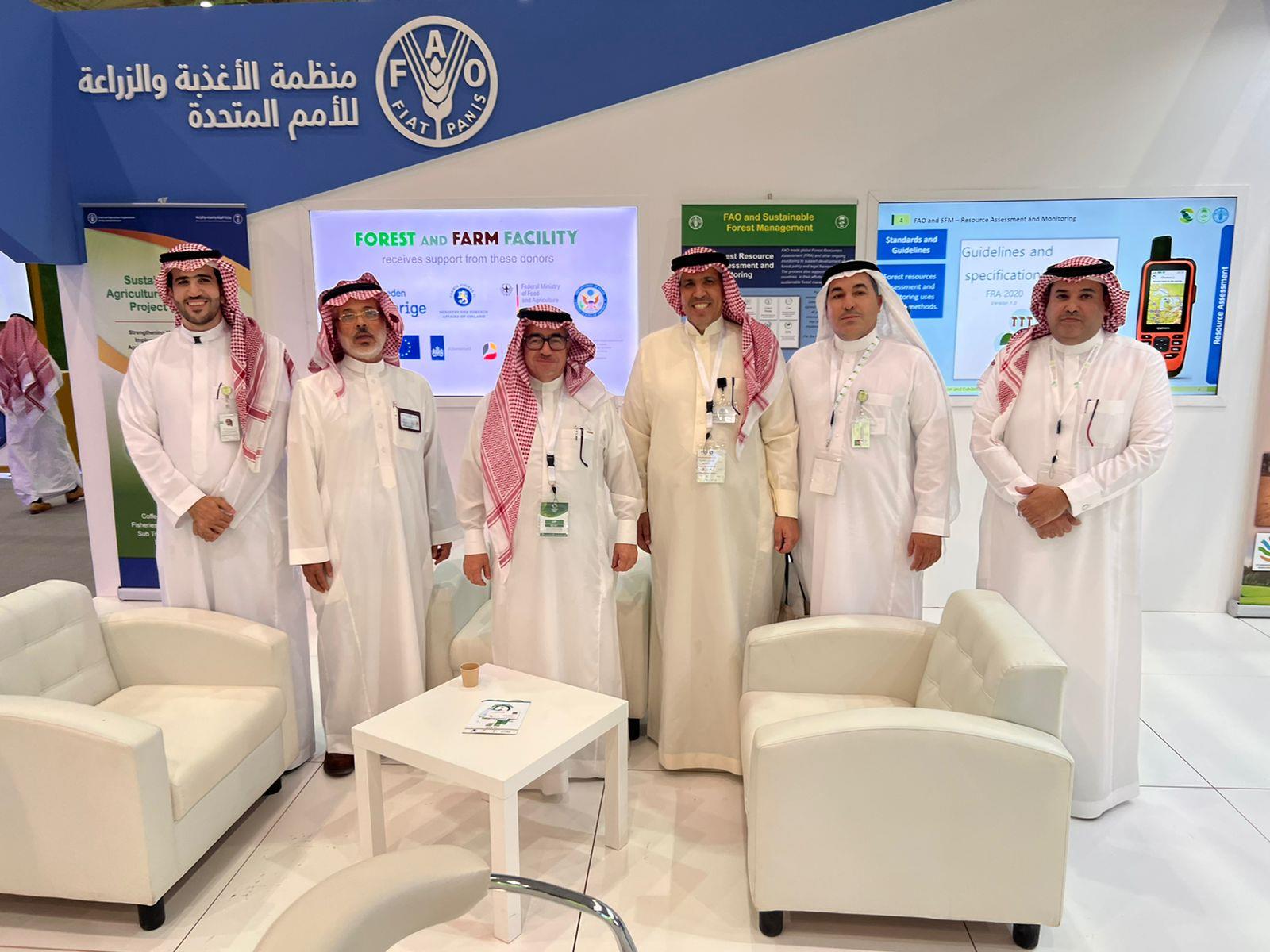FAO participates in the International Exhibition and Forum on Afforestation Technologies

Dr. Khaled Al-Abdulkader (Third from left), CEO of the National Center for the Development of Vegetation Cover and Combating Desertification visited the FAO booth during the international exhibition and forum on afforestation technologies, Riyadh, Saudi A
31 May 2022, Saudi Arabia – The Food and Agriculture Organization (FAO) of the United Nations participated in the International Exhibition and Forum for Afforestation Techniques held at the Riyadh International Center, organized by the Saudi Ministry of Environment, Water and Agriculture (MoEWA), in cooperation with the National Center for the Development of Vegetation Cover and Combating Desertification (NCVCCD), May 29-31.
Speaking at the FAO booth, Dr. Khaled Al-Abdulkader, the CEO of the National Center for Vegetation Cover and Combating Desertification (NCVCCD) praised the support provided by FAO as a member of the event’s scientific committee and appreciated the strong partnership between FAO, the Saudi Government, and the NCVCCD.
Ayman Omer, Senior Field Programme Officer, valued the environmental efforts of the Kingdom of Saudi Arabia, such as the Saudi Green Initiative and Middle East Green Initiative. He highlighted that FAO is a global leader in landscape and forest restoration and therefore a key contributor to the Kingdom's investment opportunities and innovative research towards green climate action, green economy, and sustainable development. He noted that FAO has decades of experience in afforestation at local, regional, and global levels and a large wealth of data, information, products, and tools to support afforestation efforts in Saudi Arabia.
The International Exhibition and Forum
The exhibition and forum took place from 29 to 31 May 2022 and attracted a large number of decision makers, technology solution providers, green industry leaders, private investors, academia, and the public to seek solutions for increasing vegetation cover, combating desertification and addressing climate change challenges in Saudi Arabia and the Middle East. The event provided a platform for stakeholders’ dialogues, exchange of experiences and know-how as well as partnerships networking for a greener and sustainable future. The outcomes of the event will support ongoing greening, ecosystem restoration, and climate actions by Saudi Arabia and the larger Middle East region.
FAO participation in the Exhibition and Forum
FAO delivered presentations in the technical sessions on community participation in afforestation initiatives (Markos Tibbo, FAO Senior Livestock Development Officer), and the impact of livestock grazing management on afforestation (AbdelHamied Hamid, FAO Senior Forestry Officer). A presentation by Tony Charters on opportunities to develop and regulate ecotourism to advance afforestation features work supported by FAO.
In the exhibition, FAO hosted a booth centered around sustainable forest management at national, regional, and global levels. The booth attracted many visitors including representatives from embassies, local and international NGOs, community organizations, universities and research institutions, and private investors. The visitors enjoyed discussions, consultations and a wide range of information and communication packages.
Key areas of interest presented by visitors included access to FAO databases, tools and knowledge assets, FAO modalities to support local communities, opportunities for partnership with FAO, and how FAO can support different stakeholders in developing restoration and low carbon and climate smart solutions for their sectors.
FAO Sustainable Rural Agriculture Development Project.
FAO participation in the event was organized within the framework of the Sustainable Rural Agriculture Development Project (SRADP), a multi-disciplinary project covering nine components and strategically formulated by FAO and MoEWA in alignment with the National Transformation Program under the Saudi Vision 2030. SRADP aims to contribute toward achieving the national development goal of sustainable rural agricultural development in the Kingdom. The project includes a component of natural resources management which covers sustainable forest management among other areas.
